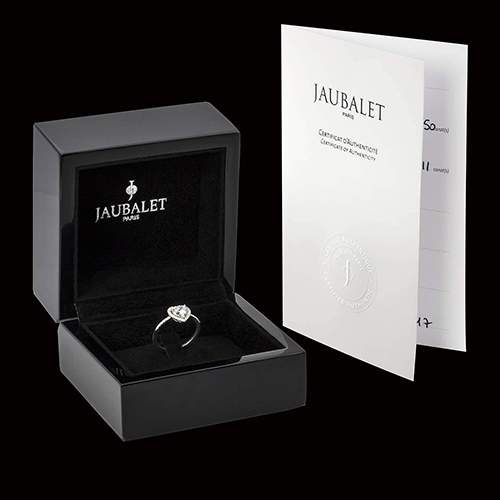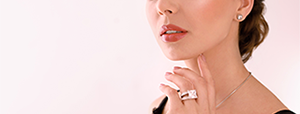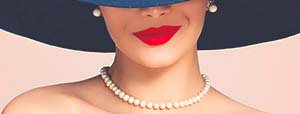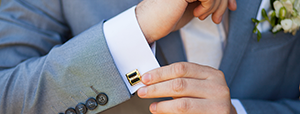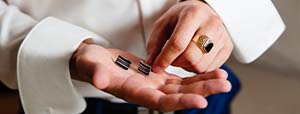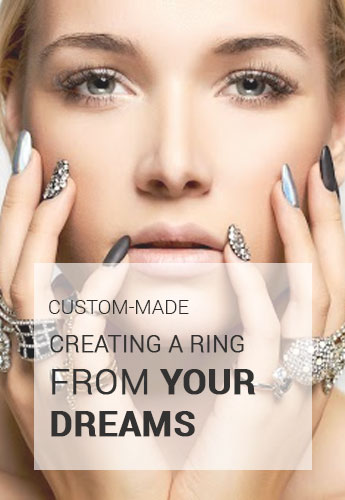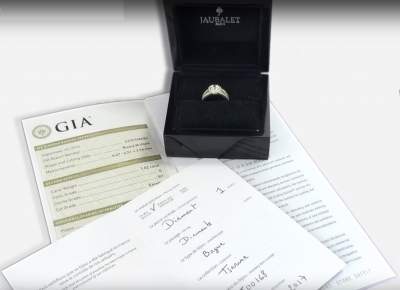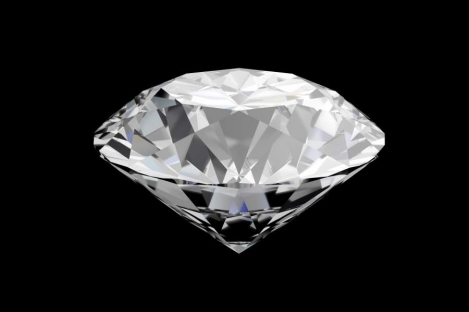
Understanding Diamond Certifications
When you buy a graded diamond, you can rest assured that you have a genuine diamond that’s of the best quality. Should you encounter a diamond seller who says there’s no need to buy a diamond that hasn’t been certified, it’s time to walk away. Whether you’re looking for a piece of women’s diamond jewellery or you want to buy a loose white diamond to add to your precious stone collection, it’s crucial that you’re aware of the parameters surrounding all of the diamond certifications available.
At Jaubalet, our experienced jewellers have deep industry knowledge and expertise, which means the diamonds we sell are graded against the most trusted Diamond Certification labs. This means that when you purchase your men’s diamond jewellery, or that perfect diamond engagement ring from our London jewellery store or online, you’re getting superlative quality precious stones from a reputable seller. But what does it actually mean for a diamond to be certified? Read on to find out more. link to engagement ring hub page when live.
What Does It Mean for a Diamond to be Certified?
A certified diamond refers to polished diamonds (100% natural or ‘enhanced’) that have been subject to a standardised analysis and classification by an expert in a trusted gemological laboratory. There are numerous gemological laboratories who issue lab reports. These reports are referred to as the diamond’s “certificate” - a piece of paper with the diamond’s gradings. Larger gemological labs act as an independent authority when they assess the quality of a diamond - they’re rarely involved in the transaction of the diamonds.
What is a Non-Certified Diamond?
A non-certified diamond is a diamond that has not been assessed against any formal gemological laboratory grading. Non-certified diamonds are commonplace in the market.
What is an Enhanced Diamond?
An enhanced diamond is a diamond that has been artificially treated to make it look like it is of higher quality. In most cases, enhanced diamonds are much cheaper and of lower quality. Whether the diamond has gone through laser drilling to banish visible inclusions, or fracture-filling to hide small cracks, there are many ways to ‘improve’ a diamond.
How is a Diamond Certified?
When the experts in any gemological lab grade a diamond they will use the GIA’s 4C’s scale as a point of reference. The certificate should tell you about the following:
- Dimensions and shape
- Weight
- Standard of finish
- Clarity, cut and colour of diamond
Remember - when you buy a high quality diamond you’ve also invested in its grading, so keep the diamond’s paperwork safe - this will be beneficial for insurance and resale purposes!
The 4C’s look at the following
- Cut : The cut of a diamond will impact its sparkle, brilliance and fire. Expert diamond cutters will determine the best cut for a diamond once it’s been recovered. The diamond’s cut should illuminate the stone’s natural optimum beauty. The cut of a diamond is graded using the following: Ideal, Premium, Very Good, Good, Fair, and Poor.
- Colour: Measured from D-Z, the colour of the diamond references the absence or presence of colour in the stone. Colourless diamonds receive a D grading, and ‘fancy yellow’ diamonds are given a Z grading. Diamonds that are closer to D on the colour scale are more desirable and therefore more valuable. Diamonds between J - R are considered to be more affordable.
- Clarity: the clarity of a diamond references the internal characteristics and visual appearance of the precious stone. The examiner refers to these internal characteristics as inclusions, and any marks on the surface are called blemishes. Blemishes and inclusions occur naturally. Clarity measurements are divided into six categories and 11 grades. These are:
○ Flawless - FL
○ Internally Flawless - IF
○ Very Very Slightly Included - VVS1, VVS2
○ Very Slightly Included - VS1, VS2
○ Slightly Included - SI1, SI2
○ Included - L1, L2, L3 Carat: Carat is the unit of measure referring to the weight of a diamond. The carat weight is not the same as the size of a diamond - this is because two diamonds with the same carats could have different cuts and are therefore different sizes. One carat is equal to 200 milligrams. You cannot dispute a diamonds carat weight because it is measured on a diamond scale. This means a diamond will always be the same weight regardless of who is measuring it.
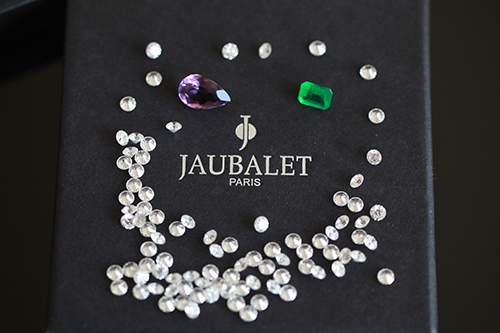
What are the most common Gemological Labs?
There are many gemological labs all over the world, but the main six are:
- Gemological Institute of America (GIA)
- American Gemological Society (AGS)
- International Gemological Institute (ISI)
- European Gemological Laboratory (EGL)
- Gemological Science International (GSI)
- Hoge Raad voor Diamant Antwerp (HRD Antwerp)
It’s important to mention that the GIA has a reputation for grading diamonds much more rigorously than other laboratories. The GIA’s reputation has proven to be consistently and historically positive.
The majority of national and international gemological laboratories will use the GIA’s 4C’s as a method of grading diamonds, but it important to remember that not all diamond certifications are equal. The GIA will not grade a diamond in the same way that HRD or EGL do. This is because diamond grading is subjective (to an extent). When purchasing a certified diamond, you should make sure the diamond has been graded by a highly reputable grading institution.
Will Gemological Labs grade an enhanced diamond?
Every diamond seller is obliged to tell you if a diamond has been artificially enhanced. Some gemological labs will refuse to grade enhanced diamonds. Other labs will state on the diamond certificate that the rock has been enhanced and what has been done to it.
Order customised jewellery from London today.
Jaubalet’s expert jewellers will create custom made jewellery using certified diamonds especially for you. Turn your dream jewellery into a reality - whether you want a pair of diamond and white gold stud earrings, or you’re looking for a vintage inspired personalised diamond ring, we will make it happen. Our revolutionary 3D technology means that you can visualise your desired piece - our experts will then turn your creativity into a high quality, luxurious piece of jewellery. Get in touch with Jaubalet today.
